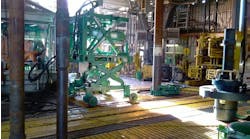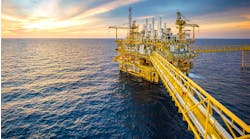Offshore staff
EDINBURGH, UK – Researchers from Heriot-Watt University are examining the potential of low-salinity water injection to prolong the lifespan of North Sea oil reservoirs.
Professor Mehran Sohrabi, director of the Centre for Enhanced Oil Recovery within the Institute of Petroleum Engineering, said: “At least half of the original oil still remains in the North Sea reservoirs, but there are great challenges in extracting it usingenhanced oil recovery (EOR) techniques. These include limited platform space and large well spacing, making extraction too expensive to pursue. Following years of research at the university we now believe we can overcome these challenges.”
He continued: “Low-salinity water injection is relatively inexpensive and can be economically implemented in the North Sea reservoirs. This system works by reducing the salt levels in sea water, which is already injected in reservoirs…
“We have developed a robust method to screen oil reservoirs to identify the ones that would respond positively to low salinity water injection. This allows us to estimate the size of incremental oil recovery which is vital for economic calculations of EOR projects…
“The process is relatively, inexpensive meaning the costs for EOR could fall dramatically, while yields could rise. It’s also cleaner as you’re removing the need for potentially toxic chemicals.”
Over the past 17 years the EOR Centre has also worked on improved gas injection technologies. In water-flooded reservoirs, the team claims, gas injection will recover the trapped oil more rapidly than low-salinity water injection.
Sohrabi said: “Gas injection is a robust process but it is difficult to simulate its performance accurately as it happens under a complex three-phase flow regime. We have developed an algorithm for accurate prediction of gas and water/alternating/gas injection performance in oil reservoirs.”
09/24/2014


